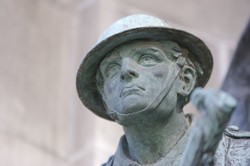War and Allied food culture
The 'Inter-Allied cultures and identities during World War 1' (WW1 ALLIED CULTURES) project included the British, the French and the American components as well as the respective imperial and colonial armies. The differences in cultures have been addressed through food identities. Food is essential during warfare to keep up the soldiers' morale. Local food was sent from families and millions of parcels provided the homemade provisions the troops needed to keep up endurance. Despite Allied rations being criticised for lack of taste, the Allied leadership was aware of the importance of food. Food brings with it religious issues and special supplies were provided in view of this, such as for the Indian troops brought to Europe. Inevitably, the First World War also saw the mixing of food ways. The intercultural identity of the entente witnessed the exchange of recipes. This was partly aided by Hoover's American Relief Administration, a USD 100 million initiative that helped Poland and famine-stricken Russia after the war. Food heritage was therefore challenged and opportunities also arose for new commercial networks. Food also structured the Allied identity and food sharing was seen as a typical Allied value. By contrast, wartime profiteers and the enemy were seen as instruments of starvation. The path to victory was paved by the 'economy of sacrifice'. Emergency food aid was therefore supported at local, national and transnational levels. Several charities, including the Croix Rouge, came to the aid of groups threatened by lack of food: children, refugees and uprooted soldiers. WW1 ALLIED CULTURES has developed a knowledge platform that could be applied in a similar study of the Second World War with a subsequent comparison. The study of coalition warfare and identities also feeds into current controversies regarding multicultural issues.



